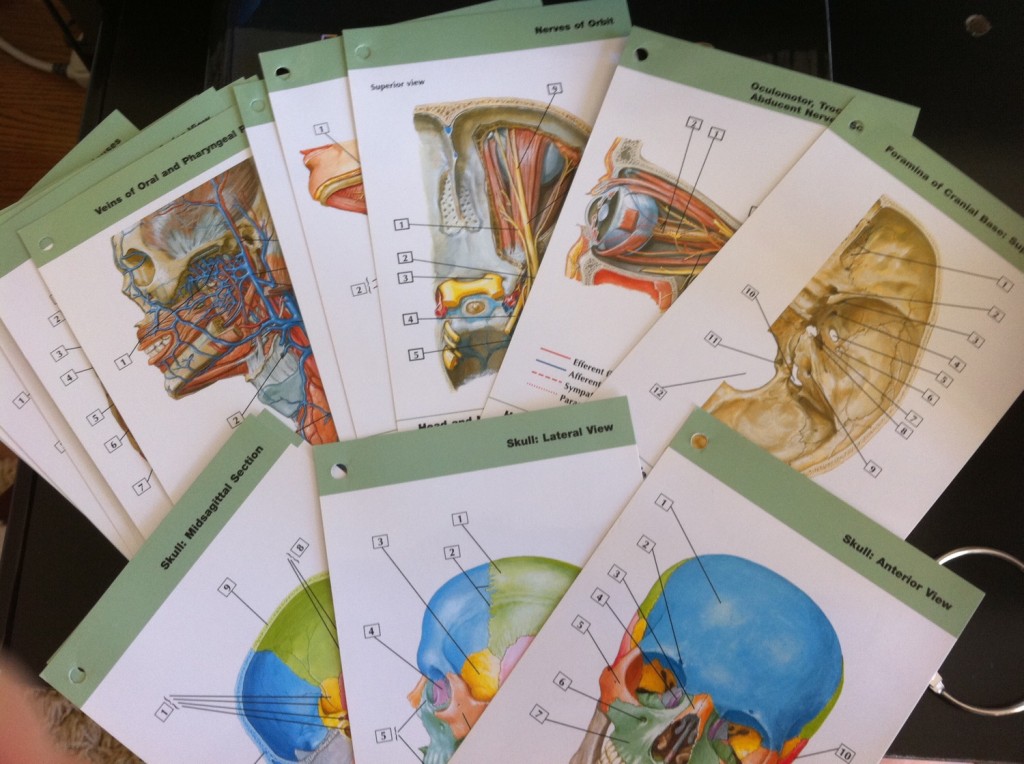OS: Congrats on being selected as our April Student in Focus! Most optometry students outside of ICO know you as the ‘OD-in-training’ star of the music video, “Thrift Opt.” Tell us a little more about yourself, your background and what got you interested in a career as an optometrist.
RM: Optometry as a career was not even a thought in my head when I was in undergrad. I went to the doctor every year just to get an updated glasses prescription and a new pair of frames and that’s it. I graduated in 2006 with a B.A. in music theory and composition and a B.S. in developmental psychology. I met my wife while acting in school theatre productions and we got married shortly after graduation. We spent the next year teaching English in Japan, and actually recorded several CDs of English learning songs for children that would be used all over the country. We ended up coming back to the United States 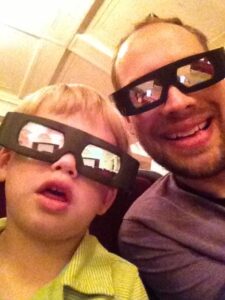 unexpectedly. I needed a job and I found a listing for a position as Vision Therapist at an optometry office in Washington, DC, known as the Vision & Conceptual Development Center. I fit the requirements but I had no idea what vision therapy was…this was optometry like I’ve never seen. I entered the world of developmental optometry and I was hooked. I began to realize I was working with and studying from some of the biggest names in the field. After 5 years of seeing how vision therapy can change patients’ lives I became inspired to become a doctor myself. With the help from the doctors at the practice, I took some pre-req classes was accepted to ICO. In addition to being a student, I’m also a full time dad to a very precocious 3 year old with another baby due any day now.
unexpectedly. I needed a job and I found a listing for a position as Vision Therapist at an optometry office in Washington, DC, known as the Vision & Conceptual Development Center. I fit the requirements but I had no idea what vision therapy was…this was optometry like I’ve never seen. I entered the world of developmental optometry and I was hooked. I began to realize I was working with and studying from some of the biggest names in the field. After 5 years of seeing how vision therapy can change patients’ lives I became inspired to become a doctor myself. With the help from the doctors at the practice, I took some pre-req classes was accepted to ICO. In addition to being a student, I’m also a full time dad to a very precocious 3 year old with another baby due any day now.
OS: What’s your favorite part of optometry school and what clubs or organizations are you most involved in?
RM: I had to think a minute about what I’m not involved in haha. This past year I served as President-elect of the Student Association. I started off my term serving as a delegate to the AOA House of Delegates at Optometry’s Meeting in San Diego. It was a great way to learn more about the ins and outs of the legislative part of optometry. I also had to plan three major events for our school: ICOlympics (a start of the year, Olympics-style competition between classes), Casino Night (a fundraiser for our SA Scholarship) and lastly our EyeBall which just took place a couple weeks ago at the Field Museum with a record attendance of 505 students and faculty! In addition, I serve as student representative to ICO’s Board of Trustees and the Alumni Council, which gives me great insight into how
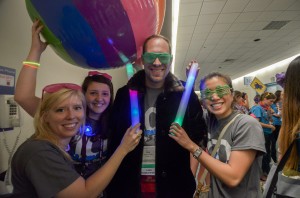 the school is run and also allows me to talk with other students about how they would like to see the school change and grow with the future of optometry.
the school is run and also allows me to talk with other students about how they would like to see the school change and grow with the future of optometry.
I also have recently been named the COVD National Student Liaison. COVD (College of Optometrists in Vision Development) is a group that offers board certification to doctors and therapists in developmental optometry and is the leading source of information on current research in vision therapy and its benefits. This really means a lot to me considering how I got my start in optometry.
Finally, I was just elected as Vice President of our Cornea and Contact Lens Society, which is an area I don’t know too much about yet I feel is worth exploring. The future of contact lenses is always changing. Google just patented a contact lens with a built in camera and glucose monitor. We know how important good blood sugar control is to the health of the eye so now imagine a contact lens that constantly measures your glucose and takes posterior pole photos at the same time!
OS: You’re going to be a 3rd year this summer! Looking back, do you have any advice for pre-optometry students or incoming first years?
RM: Two words: time management. Time can slip away from you and before you know it you’re knee deep in exams and practicals playing catch up; studying new information at 3am for tomorrow’s test because you were too busy studying for yesterday’s exam and so on. Make a schedule and don’t just write “Study Time.” Write out what you plan on studying and stick to it! We get 10 minute breaks between our classes at ICO and those can be some of my most productive times: running to the business office to drop off a request form so that we can have food at our next big event, sending emails to professors about an issue the class is having, or even studying one or two of the hundreds of drugs we need to learn for our next pharm exam. I’m able to do all of my studies, extra-curriculars, and still be a supportive father and husband because of successful time management. Most of the stress of school stems from a deficiency in this one simple area and unfortunately no one ever teaches a class on how to manage time.
Start good habits now because when you leave school it will only get more hectic. You could be seeing patients every 15 minutes for 8 or 10 hours, and if you’re a business owner you need to make time to promote your business, work with your staff, network with other doctors in the area, etc.
OS: What do you plan to do in your future as an optometric physician? Where and in what mode of practice do you see yourself in?
RM: I eventually want to own my own practice. Developmental optometry was my first true optometry love so I will always be offering that no matter where I end up, but right now I’m enjoying learning about all the other areas of optometric practice, so who knows what the future will bring.
OS: How do you see the future of optometry playing out? Any advice for students to adapt to the change?
RM: The scope of practice for optometrists is expanding all the time. There is always a new treatment or procedure that we can do. Learn everything. Even if your state doesn’t allow you to do it yet, learn about it. Read the research. You are the primary provider of eye care in this country. With internet usage being almost universal, patients have access now to information that they didn’t just 10 to 20 years ago. They will ask you questions about lasers. They have questions about vision therapy. They want to know about cataract surgery. They have a brother who has AMD and goes to the ophthalmologist to get injections in the eye and want to know what exactly they are getting. If you can’t answer these questions you’ll lose your patients. Stay current.
I would also urge all students to at least consider vision therapy or learn a little about it. Everything we can 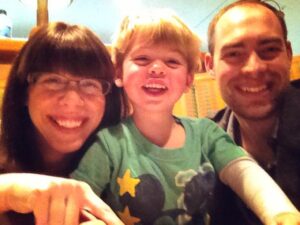 do, so can ophthalmologists…except vision therapy. That is unique to optometry. It sets us apart as a profession.
do, so can ophthalmologists…except vision therapy. That is unique to optometry. It sets us apart as a profession.
OS: What are your other interests outside of optometry? Any interesting facts about yourself?
RM: I spend most of my time outside of school with my family; spending my weekends at the zoo or park, or seeing a new exhibit at one of the many museums in Chicago. I play piano and I love to cook. I feel that food and nutrition is very important to understand. Food is our first medicine and can have profound impacts on our bodies. A doctor who ignores the power of food is not a doctor I wish to visit.
OS: What’s your all-time favorite meal?
RM: So I approached this question by thinking about what I would eat every day if I had a choice and it came down to a toss-up between two things: a hot, steamy bowl of beef pho and chocolate banana milkshakes.
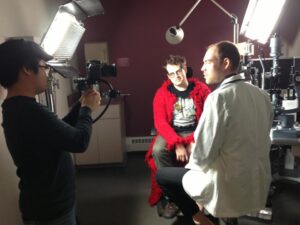 OS: We have to ask….any future plans starring in a new optometry parody video? You were awesome in “Thrift Opt,” we want more!
OS: We have to ask….any future plans starring in a new optometry parody video? You were awesome in “Thrift Opt,” we want more!
RM: Hahaha thanks. At this time we are not currently in production on any projects although I think everyone involved in Thrift Opt would like to get something going again. Maybe OptometryStudents.com would like to produce something with us?
OS: We’re open to suggestions!! Thanks so much for taking time with us, for offering your intelligent and informed perspective on the profession and for giving solid advice to students.



